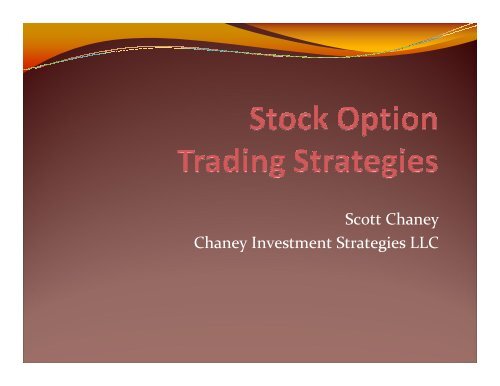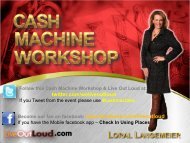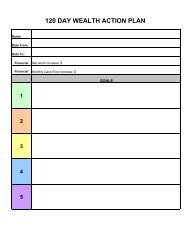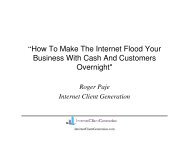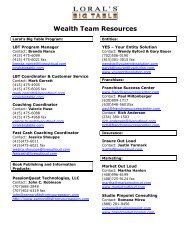Scott Chaney Chaney Investment Strategies LLC - Live Out Loud
Scott Chaney Chaney Investment Strategies LLC - Live Out Loud
Scott Chaney Chaney Investment Strategies LLC - Live Out Loud
Create successful ePaper yourself
Turn your PDF publications into a flip-book with our unique Google optimized e-Paper software.
<strong>Scott</strong> <strong>Chaney</strong><br />
<strong>Chaney</strong> <strong>Investment</strong> <strong>Strategies</strong> <strong>LLC</strong>
.<br />
Introduction to<br />
Stock Options
What is a Stock Option?<br />
CALL option: An agreement (contract) that gives<br />
the owner (buyer) the right, but not the<br />
obligation, to buy an underlying stock at a<br />
specified price within a specific time period, i.e.<br />
until the option expires.
CALL Options<br />
Positive Pete<br />
Thinks the stock price will go UP!<br />
Wants to buy CALL options<br />
Expects to profit from the rising stock price
What is a Stock Option?<br />
Negative Nellie<br />
Thinks the stock price will go DOWN!<br />
Wants to buy PUT options<br />
Expects to profit from the declining stock price
What is a Stock Option?<br />
PUT option: An agreement (contract) that gives<br />
the owner (buyer) the right, but not the<br />
obligation, to sell an underlying stock at a<br />
specified price within a specified time period, i.e.<br />
until the option expires.
What is a Stock Option?<br />
Where does the money go?
Option Trading Strategy:<br />
Spread<br />
A “spread” trade refers to the simultaneous buying of<br />
one option contract and selling another related one in<br />
an attempt to profit from the change in the price<br />
difference between the two.<br />
The next few slides illustrate spread trades using<br />
Potash Corp. stock options
.<br />
Index Option<br />
Trading <strong>Strategies</strong>
What is an Index?<br />
A statistical measure of the changes in a portfolio of stocks<br />
representing a portion of the overall market; not a single<br />
stock or collection of stocks that you can actually purchase<br />
When most people talk about “the market” they are<br />
actually referring to an index such as the Dow Jones<br />
Industrial Average, the S&P 500, or the NASDAQ<br />
Composite
Stock options vs. Index options<br />
Index options generally behave the same as stock options,<br />
but they have some advantages for traders:<br />
Reduced volatility (an index can’t go bankrupt)<br />
No time wasted searching for a good stock to trade!
Trading as a Business<br />
Must qualify as a “Trader in Securities” according to IRS<br />
standards:<br />
“You must seek profit from daily market movements in<br />
the prices of securities and not from dividends, interest, or<br />
capital appreciation”<br />
“Your activity must be substantial”<br />
“You must carry on the activity with continuity and<br />
regularity”<br />
(from IRS publication 550)
Trading as a Business<br />
“Traders” are not “Investors”, according to IRS<br />
A “Trader” is operating a business; file tax returns<br />
accordingly (compare t0 used car dealer)<br />
Can be self-employed, <strong>LLC</strong>, or Corporation<br />
Unique tax advantages (no self-employment tax)
April 2009<br />
SUNDAY MONDAY TUESDAY WEDNESDAY THURSDAY FRIDAY SATURDAY<br />
1 2 3 4<br />
5 6 7 8 9 10 11<br />
12 13 14 15 16 17<br />
OPTIONS<br />
EXPIRE<br />
18<br />
GOLF<br />
19<br />
20<br />
21<br />
22<br />
23<br />
24 25<br />
GOLF<br />
GOLF<br />
GOLF<br />
GOLF<br />
GOLF<br />
26 27 28 29 30
Stock Option Trading <strong>Strategies</strong><br />
Questions?
Stock Option Trading <strong>Strategies</strong><br />
Question: Can I do this with my IRA account?
ROTH IRA Conversion<br />
In 2009:<br />
2009 2010 2011 2012 2013 2014 2015<br />
$200,000 April 15:<br />
conversion Taxes due;<br />
to ROTH ~$60,000<br />
----------------------------------------------------------------------------<br />
In 2010:<br />
Jan. 2010: income: income:<br />
$200,000 $100,000 $100,000<br />
conversion<br />
tax due on taxes due on<br />
2011 income 2012 income<br />
~$30,000 ~$30,000
Stock Option Trading <strong>Strategies</strong><br />
What if the stock market crashes?
Stock Option Trading <strong>Strategies</strong><br />
Question: Who buys PUT options on an Index?<br />
Answer: Institutional investors (Mutual Funds, Pension<br />
Funds, Non-profit Trust Funds) with a large portfolio of<br />
stocks worth many millions of dollars.<br />
If the value of the fund portfolio has risen significantly,<br />
the fund manger may want to protect the fund from a<br />
market downturn. Buying PUTS on each individual stock is<br />
inefficient. The manager will instead buy PUTS on a major<br />
market index.
Stock Option Trading <strong>Strategies</strong><br />
Thank you!
Option Trading Strategy:<br />
Spread<br />
The Spread Trade strategy is designed to earn profits from<br />
Time Decay, not from active trading or “day trading”.
Time Decay<br />
As time passes, the market value of a stock option<br />
decreases as the expiration date approaches.<br />
Approximately 30 days prior to expiration, a stock<br />
option will begin to lose its Time Value quite rapidly.
Time Decay
.<br />
Question: Who buys PUT options?<br />
Answer:<br />
Active Traders, and Long-term Investors<br />
If the price of a stock spikes up, a Long-term Investor<br />
may want to buy a PUT option to “lock in” his profit, rather<br />
than sell his stock and incur a tax on the profit. The PUT<br />
option will rise in value if the stock price falls, and the<br />
investor will profit from the increased value of the PUT<br />
option.


